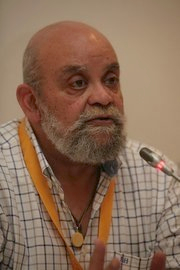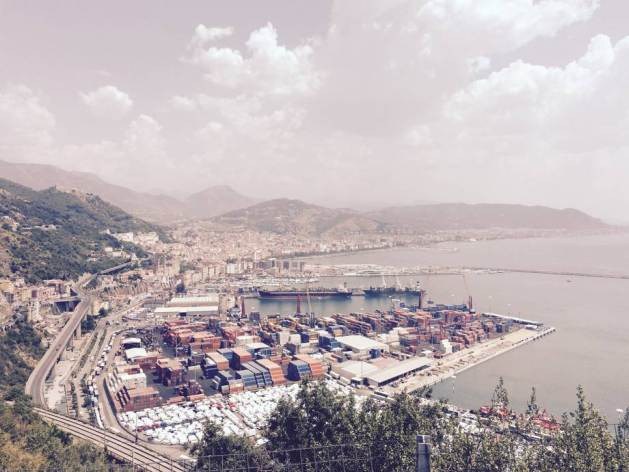By Baher Kamal*
… That TV probably arrived in a containership; the grain that made the bread in that sandwich came in a bulk carrier; the coffee probably came by sea, too. Even the electricity powering the TV set and lighting up the room was probably generated using fuel that came in a giant oil tanker.”
This is what the International Maritime Organisation (IMO) wants everybody to keep in mind ahead of this year’s World Maritime Day.
“The truth is, shipping affects us all… No matter where you may be in the world, if you look around you, you are almost certain to see something that either has been or will be transported by sea, whether in the form of raw materials, components or the finished article.”
Yet few people have any idea just how much they rely on shipping. For the vast majority, shipping is out of sight and out of mind, IMO comments.
“This is a story that needs to be told… And this is why the theme that has been chosen for the World Maritime Day 2016 is “Shipping: indispensable to the world.” The Day is marked every year on 29 September.
Over 80 Per Cent of Global Trade Carried by Sea

Meanwhile, another UN organisation–the United Nations Conference on Trade and Development (UNCTAD), informs that around 80 per cent of global trade by volume and over 70 per cent of global trade by value are carried by sea and are handled by ports worldwide.
These shares are even higher in the case of most developing countries, says UNCTAD.
“There are more than 50,000 merchant ships trading internationally, transporting every kind of cargo. The world fleet is registered in over 150 nations and manned by more than a million seafarers of virtually every nationality.”
A Floating Threat
All this is fine. But as another major United Nations organisation also reminds that not all is great about sea-born trade. See what happens.
‘A Floating Threat: Sea Containers Spread Pests and Diseases’ is the title of an information note issued on August 17 by the Rome-based Food and Agriculture Organisation of the United Nations (FAO).
FAO highlights that that while oil spills garner much public attention and anguish, the so-called “biological spills” represent a greater long-term threat and do not have the same high public profile. And gives some good examples.
“It was an exotic fungus that wiped out billions of American chestnut trees in the early 20th century, dramatically altering the landscape and ecosystem, while today the emerald ash borer – another pest that hitch-hiked along global trade routes to new habitats – threatens to do the same with a valuable tree long used by humans to make tool handles, guitars and office furniture.”
FAO explains that perhaps the biggest “biological spill” of all was when a fungus-like eukaryotic microorganism called Phytophthora infestans – the name of the genus comes from Greek for “plant destroyer” – sailed from the Americas to Belgium. Within months it arrived in Ireland, triggering a potato blight that led to famine, death and mass migration.
“The list goes on and on. A relative of the toxic cane toad that has run rampant in Australia recently disembarked from a container carrying freight to Madagascar, a biodiversity hotspot, and the ability of females to lay up to 40,000 eggs a year make it a catastrophic threat for local lemurs and birds, while also threatening the habitat of a host of animals and plants.”
In Rome, FAO informs, municipal authorities are ramping up their annual campaign against the tiger mosquito, an invasive species that arrived by ship in Albania in the 1970s. Aedes albopictus, famous for its aggressive biting, is now prolific across Italy and global warming will make swathes of northern Europe ripe for colonisation.
“This is why the nations of the world came together some six decades ago to establish the International Plant Protection Convention (IPPC) as a means to help stem the spread of plant pests and diseases across borders boundaries via international trade and to protect farmers, foresters, biodiversity, the environment, and consumers.”
“The crop losses and control costs triggered by exotic pests amount to a hefty tax on food, fibre and forage production,” says Craig Fedchock, coordinator of the FAO-based IPPC Secretariat. “All told, fruit flies, beetles, fungi and their kin reduce global crop yields by between 20 and 40 per cent.”

Trade as a Vector, Containers as a Vehicle
Invasive species arrive in new habitats through various channels, but shipping, is the main one, FAO reports.
“And shipping today means sea containers: Globally, around 527 million sea container trips are made each year – China alone deals with over 133 million sea containers annually. It is not only their cargo, but the steel contraptions themselves, that can serve as vectors for the spread of exotic species capable of wreaking ecological and agricultural havoc.”
For example, an analysis of 116,701 empty sea containers arriving in New Zealand over the past five years showed that one in 10 was contaminated on the outside, twice the rate of interior contamination.
“Unwelcome pests included the gypsy moth, the Giant African snail, Argentine ants and the brown marmorated stink bug, each of which threaten crops, forests and urban environments. Soil residues, meanwhile, can contain the seeds of invasive plants, nematodes and plant pathogens,” FAO informs.
“Inspection records from the United States, Australia, China and New Zealand indicate that thousands of organisms from a wide range of taxa are being moved unintentionally with sea containers,” the study’s lead scientist, Eckehard Brockerhoff of the New Zealand Forest Research Institute, told a recent meeting at FAO of the Commission on Phytosanitary Measures (CPM), IPPC’s governing body.
These phytosanitary (the health of plants) measures are intended to ensure that imported plants are free of specified pests.
Here, FAO warns that damage exceeds well beyond agriculture and human health issues. Invasive species can cause clogged waterways and power plant shutdowns.
Biological invasions inflict damages amounting to around five per cent of annual global economic activity, equivalent to about a decade’s worth of natural disasters, according to one study, Brockerhoff said, adding that factoring in harder-to-measure impacts may double that.
Around 90 per cent of world trade is carried by sea today, with vast panoply of differing logistics, making agreement on an inspection method elusive. Some 12 million containers entered the U.S. last year, using no fewer than 77 ports of entry.
“Moreover, many cargoes quickly move inland to enter just-in-time supply chains. That’s how the dreaded brown marmorated stink bug – which chews quickly through high-value fruit and crops – began its European tour a few years ago in Zurich.”
This animal actively prefers steel nooks and crannies for long-distance travel, and once established likes to set up winter hibernation niches inside people’s houses.
*Baher Kamal’s report was published in IPS. Go to Original.
—
 *Baher Kamal, Egyptian-born, Spanish-national secular journalist. He is founder and publisher of Human Wrongs Watch. Kamal is a pro-peace, non-violence, human rights, coexistence defender, with more than 45 years of professional experience.
*Baher Kamal, Egyptian-born, Spanish-national secular journalist. He is founder and publisher of Human Wrongs Watch. Kamal is a pro-peace, non-violence, human rights, coexistence defender, with more than 45 years of professional experience.Baher Kamal is also Senior Advisor to the Director General of international news agency IPS on Africa and the Middle East.
More articles by Baher Kamal in Human Wrongs Watch:
One Humanity? Millions of Children Tortured, Smuggled, Abused, Enslaved…
Arable Lands Lost at Unprecedented Rate: 33,000 Hectares… a Day!
War on Climate Terror (II): Fleeing Disasters, Escaping Drought, Migrating
War on Climate Terror (I): Deserts Bury Two Thirds of African Lands
African Farmers Can Feed the World, If Only…
Climate Victims – Every Second, One Person Is Displaced by Disaster
400 Million People Live with Hepatitis But They Do Not Know
Rights of Indigenous Peoples ‘Critical’ to Combat Climate Change
Forests: To Farm or Not to Farm? That’s the Question!
‘Monster’ El Niño Subsides, ‘Monster’ La Niña Hitting Soon
‘Modern World Is Chaotic, Confused; Human Security a Must’
Xenophobic Rhetoric, Now Socially and Politically ‘Acceptable’ ?
‘Hate Is Mainstreamed, Walls Are Back, Suspicion Kills’
What If Turkey Drops Its “Human Bomb” on Europe?
Humanitarian Aid – Business As Unusual?
World Oceans Day – A Death Sea Called Mediterranean
The Humanitarian Clock Is Ticking, The Powerful Feign Deafness
Humanitarian Summit, The Big Fiasco
Humanitarian Summit: Too Big to Fail?
Humanitarian Summit Aims to Mobilise Up to 30 Billion Dollars
Africa, Resolved to Address African Problems With African Solutions
‘We Cannot Keep Jumping from Crisis to Crisis’
‘Human Suffering Has Reached Staggering Levels’
Now 1 in 2 World’s Refugees Live in Urban Areas
Middle East – The Mother of All Humanitarian Crises
Mideast: 1 in 3 Pays Bribe to Access Basic Public Services
Climate: Africa’s Human Existence at Severe Risk
No Water in the Kingdom of the Two Seas – Nor Elsewhere
Will the Middle East Become ‘Uninhabitable’?
Can an Animal Heist Fable Help Solve the Middle East Crisis?
A “Colombian Triangle” for Daesh in Libya?
‘Take My Iraqis and Give Me Some Syrians’ – Europe to Turkey
New Nuclear Hysteria in the Middle East
Africa Launches Largest Trading Block with 620 Million Consumers
Big War Lords Playing Brinkmanship Game in Syria
Cameron at large: Want Not to Become a Terrorist? Speak Fluent English!
Women’s Rights First – African Summit
Africa, Only If It Bleeds It Leads?
Seven Top Challenges Facing African Women
Once Auctioned, What to Do with the ‘Stock’ of Syrian Refugees?
Silence, Please! A New Middle East Is in the Making
The Over-Written, Under-Reported Middle East (II): 99.5 Years of (Imposed) Solitude
The Over-Written, Under-Reported Middle East (I): Of Arabs and Muslims
Egypt in the Rear Mirror (I): The Irresistible Temptation to Analyse What One Ignores
Egypt in the Rear Mirror (II): Who Are the Not-So-Invisible Powers Behind the Troglodytes?
Fed Up With Empty Promises, The Arabs May Abandon Nuclear Non-Proliferation Treaty
Anti-Nukes Move from Norway to Bahrain
Middle East Nuclear Free Bid Moves to Finland – Yet Another Lost Chance?
Annual Spending on Nuclear Weapons, Equivalent To UN Budget For 45 Years
Watch The Sky–It May Rain Atomic Bombs
Save The Planet? Just Eat Cars, Drink Fuel!
Who Is Afraid of 300 Or 400 Or 500 Million Miserables?
Violence And Death For Millions Of Life-Givers
Whither Egypt (I) – Did You Say Dictatorship?
Whither Egypt (II) – Economic Bankruptcy
Politicians Promote Fossil Fuels with Half a Trillion Dollars a Year
Who Dares to Challenge a 32 Billion Dollars Business – Human Trafficking?
Palestine: Yet Another One Hundred Years of Solitude
Does Anyone Know Anything About A New Country Called South Sudan?
South Sudan: Yet Another Kitchen-Garden?
Somalia? Which Somalia? Some Facts About Everybody’s — Nobody’s Land
2016 Human Wrongs Watch






